On behalf of the non-partisan Jewish Electorate Institute (JEI), Garin-Hart-Yang conducted an online survey of 810 Jewish voters nationally who self-identify as Jewish and indicate that they are likely to vote in the November 2020 election. The survey, which was conducted from September 2 to 7, 2020, has a margin of error of ±3.5 percentage points.
Topline Analysis of the Data Regarding the Jewish Electorate
- 67% of Jewish voters disapprove of President Trump’s job performance. This is about 15% higher than the American electorate as a whole.
- 70% of Jewish voters view Joe Biden in favorable terms, more than 20% higher than the American electorate.
- Biden overwhelmingly leads President Trump on every issue, including Israel.
- Kamala Harris matches Biden in favorability among Jewish voters.
- 90% of Jewish voters said the federal government’s response to the coronavirus pandemic is an important issue to consider when deciding which candidate to vote for.
- A majority of Jewish voters believe that Trump deserves the greatest blame for the spread of coronavirus, and less than a quarter of Jewish voters trust Trump on the federal government’s response to the coronavirus.
- More than 80% of Jewish voters believe the rise of anti-Semitism and white nationalism are very important issues to consider when deciding which candidate to support. Nearly two-thirds of Jewish voters trust Joe Biden more on anti-Semitism, and one quarter of Jewish voters trust Donald Trump.
- Most Jewish voters feel less secure than they did four years ago, and a majority believe they will be less safe if Trump is reelected.
- 88% of Jewish voters self-identify as pro-Israel, and a majority of Jewish voters are critical of at least some of the current Israeli government’s policies. Democratic and Republican Jewish voters identify as pro-Israel at the same level.
- Jewish voters prioritize domestic policy issues over Israel when asked which issues are most important. Less than one-fifth of respondents said Israel is the one of the most important issues when deciding which candidate to support.
- The Israel-UAE agreement had no effect on a majority of Jewish voters’ view of Donald Trump. Jewish voters trust Biden more than Trump on Israel.
- Unlike other constituencies, most Jewish voters plan to vote BEFORE election day AND feel comfortable with non-in-person voting methods.
Detailed analysis of selected findings of the JEI survey are as follows.
1. Jewish voters overwhelmingly disapprove of President Trump’s job performance, with more than three-in-five saying they strongly disapprove of Trump.
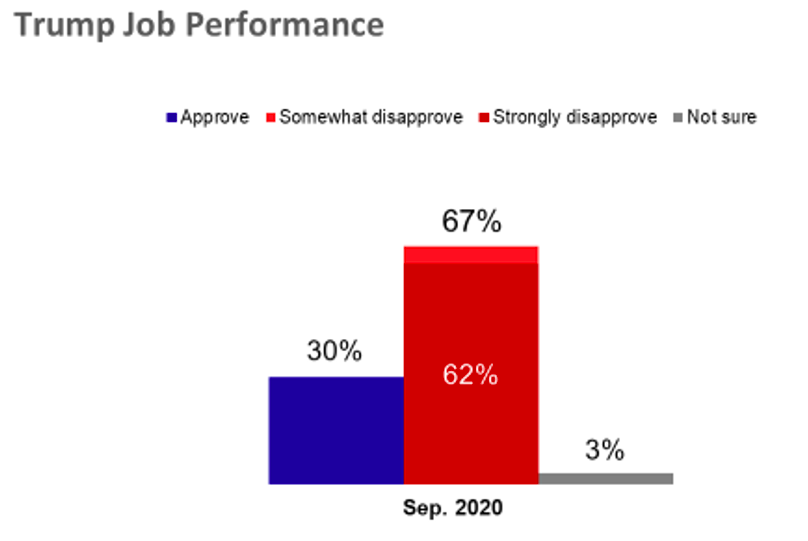
Ninety-two percent of Biden supporters strongly disapprove of Trump, while just two-thirds (64%) of Trump supporters strongly approve of Trump’s performance.
Jewish voters remain strongly anti-Trump, and more so than the overall electorate. According to a CNN national survey from August 28 to September 1, Trump’s performance as president was measured at 41% approve and 53% disapprove.
2. Joe Biden and Kamala Harris both have favorable ratings among 70% of Jewish voters, while Donald Trump and Mike Pence receive nearly similar unfavorable ratings.
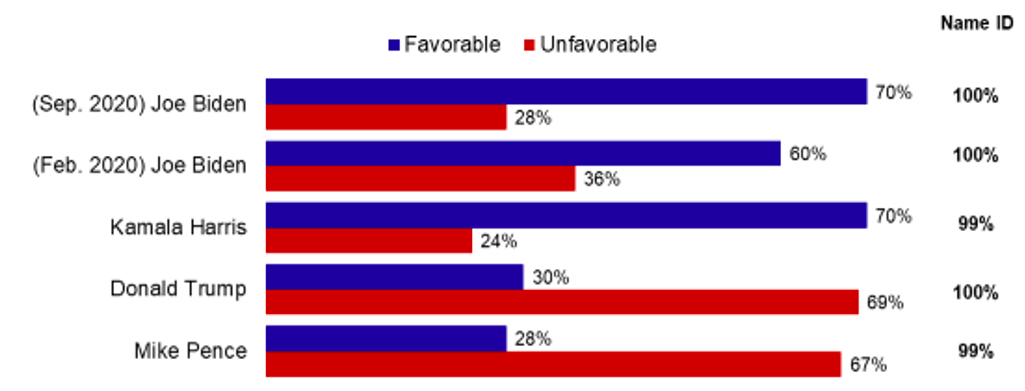
Joe Biden’s approval rating is 10% higher than the February 2020 survey, and 40% higher than Trump’s rating. The August 28 to September 1 CNN national survey referenced earlier showed Biden with a 48% favorable and 43% unfavorable rating.
3. The low number of “undecided” responses (3%) suggests a Jewish electorate that is pretty much locked in place. Biden leads among nearly every major subgroup except obvious ones (e.g., Republicans). Two-thirds of Jewish voters say they will vote for Joe Biden over President Trump, and three-quarters of Jewish women say they favor Biden.
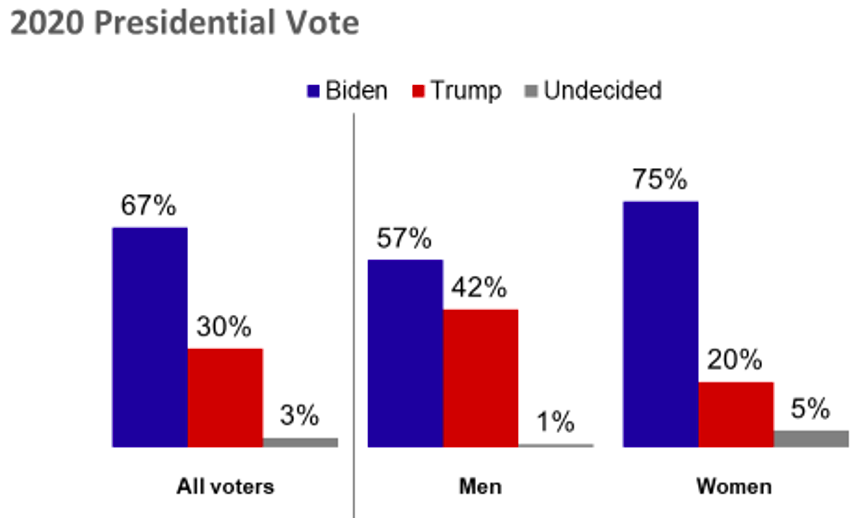
4. Domestic issues, such as the coronavirus, Medicare, and Social Security, health care, the economy, and the rise of anti-Semitism are the top issues for Jewish voters. When asked about the issues that are most important when selecting a candidate, Israel remains among the lowest priorities for Jewish voters.[1]
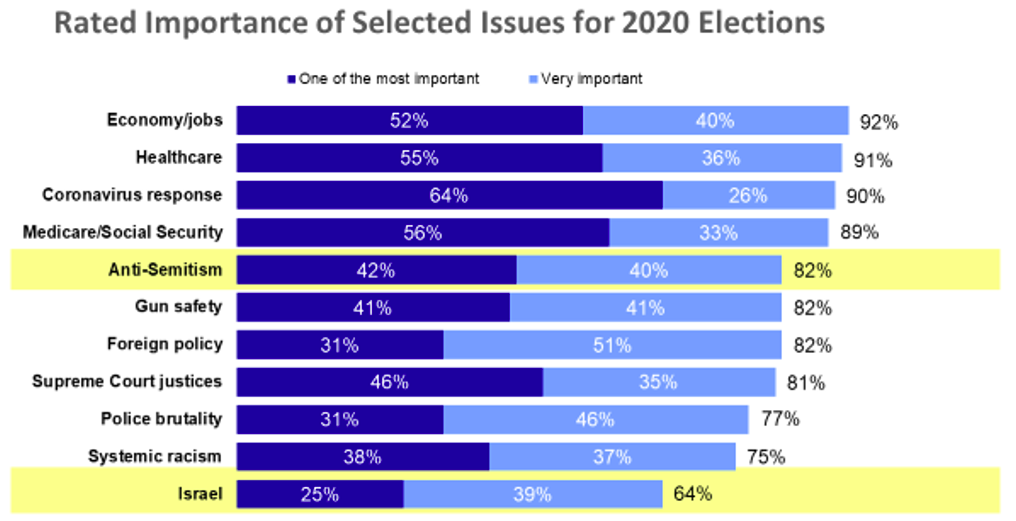
5. When asked to compare trust in Biden or Trump on a number of issues, Biden leads Trump on every item tested, although there is some variation. Biden has overwhelming leads on the electorate’s pressing priorities of coronavirus, health care, and climate change, but Biden also enjoys solid leads on economy/jobs and issues related to Israel.
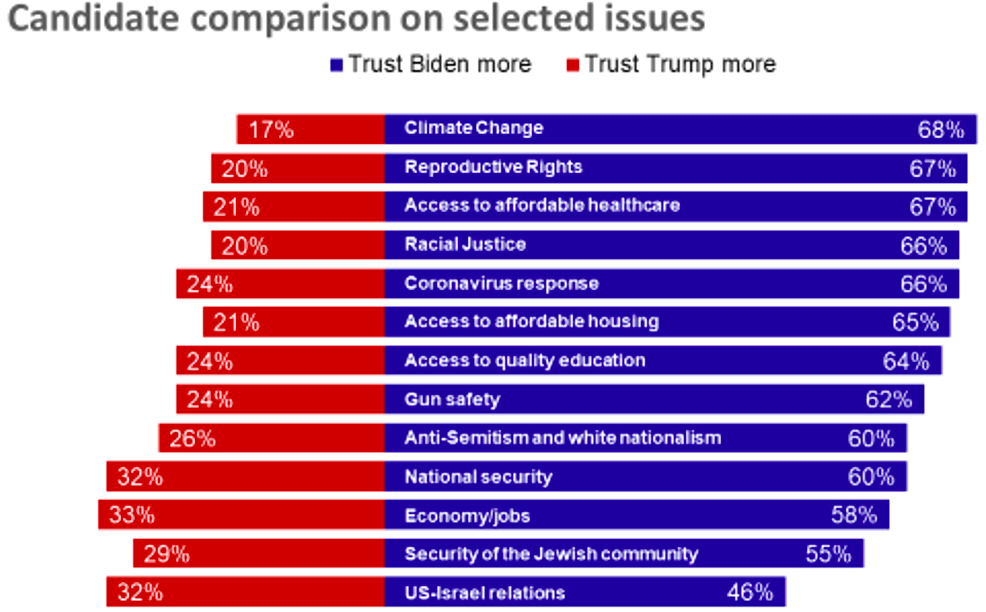
The recent CNN survey shows Biden leading Trump by comfortable margins in 6 of the 7 issues tested, while Trump has a narrow 49%-48% lead on the economy among the national electorate. However, Jewish voters prefer Biden over Trump by 25% percent (as noted in the chart above) on the economy.
6. The low importance of Israel as a voting issue in 2020 does NOT mean a corresponding diminution of Jewish voters’ support for Israel. Nearly nine-in-10 (88%) of respondents surveyed describe themselves as generally pro-Israel, which is at the same high level as in the Jewish Electorate Institute’s 2019 and 2018 surveys. Democrats (87%) and Republicans (87%) characterize themselves as pro-Israel at the exactly the same level. While respondents are strongly pro-Israel, we find that half of the Jewish electorate are critical of at least some of the current Israeli government’s policies.
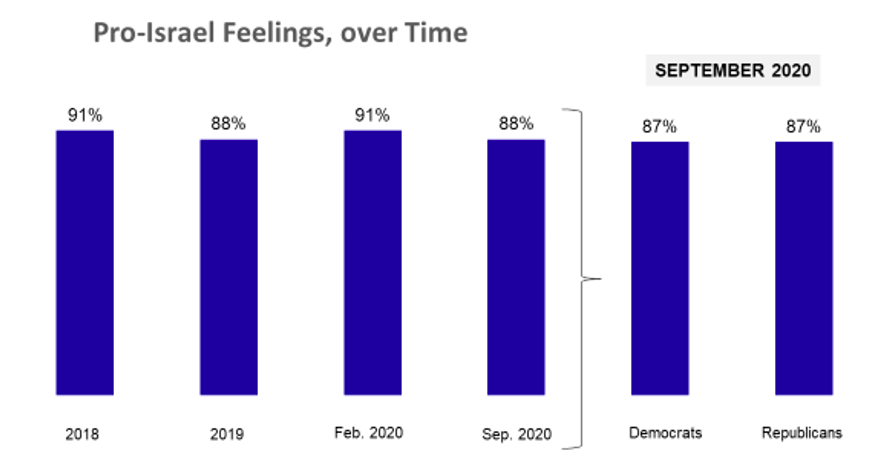
7. A substantial proportion of Jewish voters personally feel less safe than they did at the start of the Trump presidency and believe that Jewish Americans are less safe than they were four years ago.
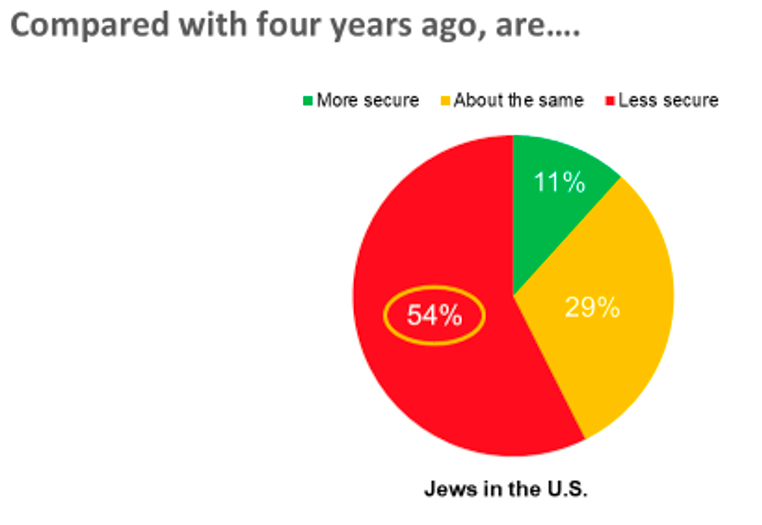
Furthermore, Jewish voters believe by better than two-to-one that Jews will become less safe if Donald Trump is reelected, with four-fifths of Biden supporters saying Jews will be less safe, versus 71% of Trump supporters who believe they will be safer. Sixty percent of Jewish voters trust Joe Biden more on the rise of anti-Semitism and white nationalism.
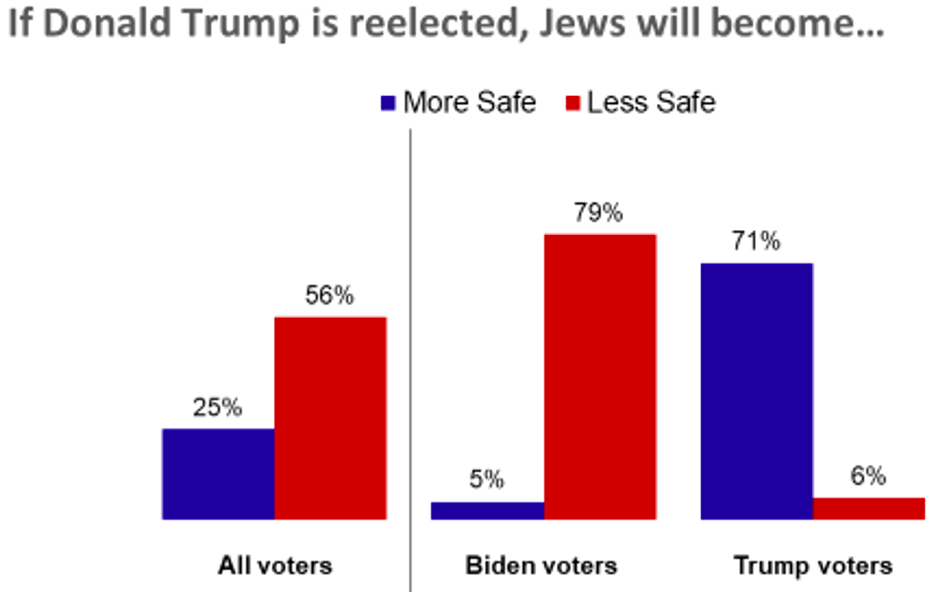
8. A sizeable proportion of Jewish voters place importance on issues of systemic racism and police brutality. In addition, the survey shows Jewish voters have positive impressions of the protestors for racial justice and Black Lives Matter.
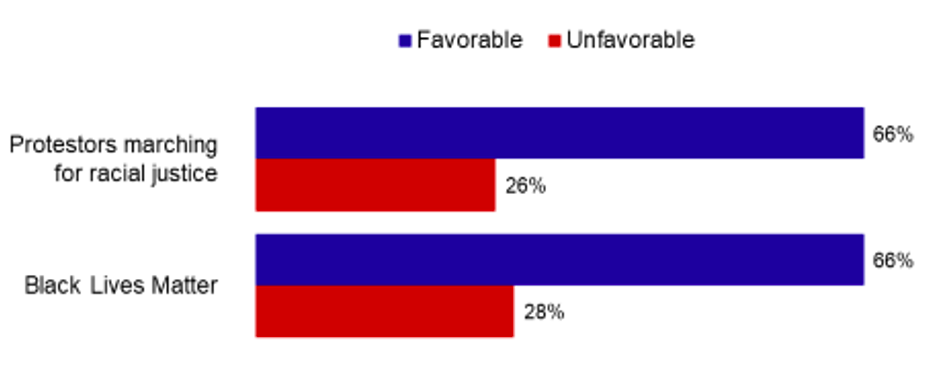
Younger Jewish voters (ages 18-29) have slightly more positive views of the protestors and the Black Lives Matter (BLM) movement than the overall electorate (the CNN national survey, for example, showed BLM’s image as 51% favorable and 38% unfavorable), and older Jews have positive feelings toward both groups by better than two-to-one. Almost two-fifths of Jewish Republicans have positive impressions of the protestors and BLM.
9. More than 90% of respondents said they’re almost certain to vote in the 2020 election. When asked how they will cast their ballot for the election, 63% will vote absentee or early in person, and just 28% say they will vote on Election Day.
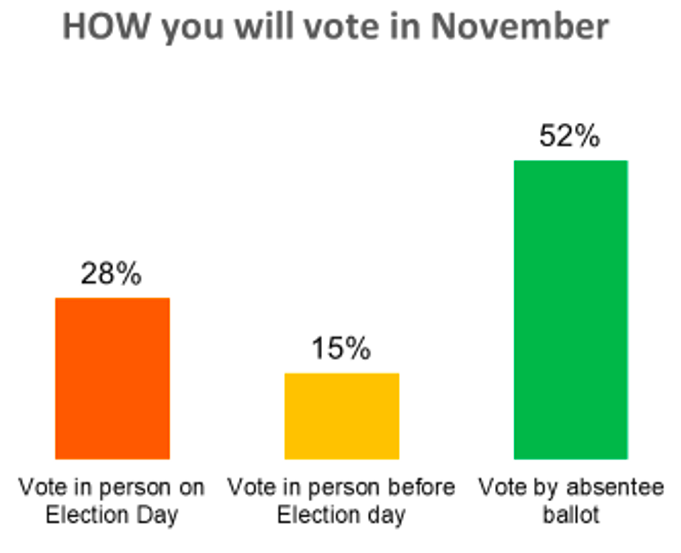
A little less than two-fifths of Jews under age 60 plan to vote on Election Day (compared to just 17% of Jews age 60+), but a plurality of these younger Jews still plan to vote by some form of absentee ballot.
Unlike polling that’s been conducted among other voter groups or the general voting population, Jewish voters express a high level of comfort with the various means of non-in-person voting (an important factor in the era of coronavirus), with in-person voting having the least amount of comfort.
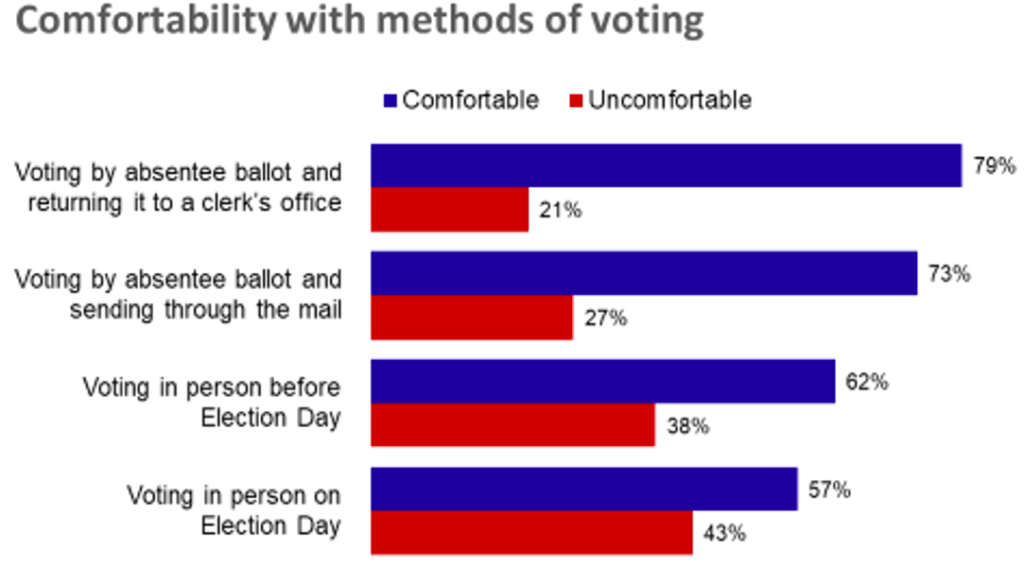
[1] These results are virtually identical to the 2019 polling we conducted for the Jewish Electorate Institute, when we asked about Israel in a slightly different way: “How important will a candidate’s position on Israel be for you personally in deciding who you will vote for in the November 2020 election?”

